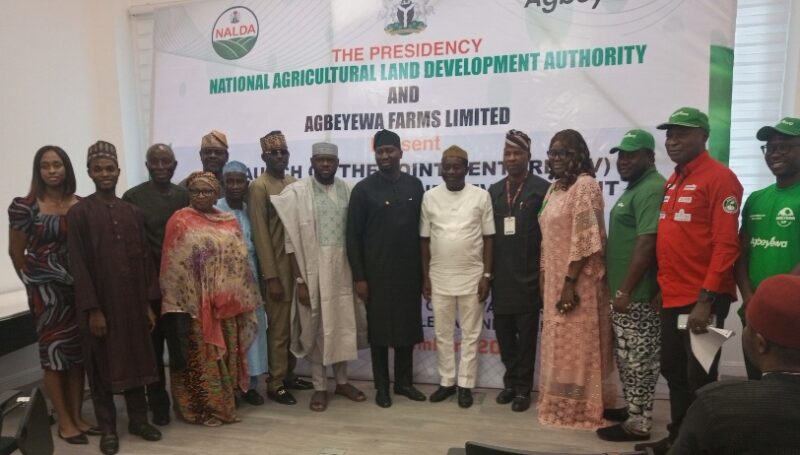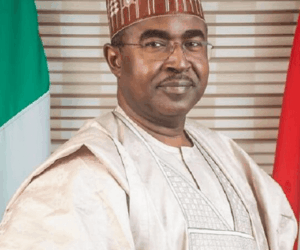The National Agricultural Land Development Authority (NALDA) has signed a strategic Memorandum of Understanding (MoU) with Agbeyewa Farms Limited, designating the firm as the anchor operator for NALDA’s Cassava Farm Estate in Ekiti State.
The partnership, officials say, will drive Nigeria’s participation in the $3.65 billion global cassava trade and create thousands of jobs under President Bola Ahmed Tinubu’s Renewed Hope Agenda.
Speaking at the signing ceremony in Abuja, Prince Cornelius Adebayo, executive secretary, NALDA said “Nigeria produces about 65 million metric tonnes of cassava annually—the largest globally—but shockingly, we only play in about $1 million of the $3.65 billion global cassava export market.”
“This partnership is our response to that imbalance. We are determined to make Nigeria a major player in cassava derivatives such as starch, sorbitol, flour, and ethanol. Agbeyewa Farms, as the largest cassava farm in the country, will anchor this revolution.”
Adebayo noted that NALDA will clear 5,000 additional hectares of land for Agbeyewa Farms to expand its operations, in addition to the company’s existing 3,000 hectares.
“NALDA is not doing it for free,” he added. “Agbeyewa will pay back at a reduced rate over a longer period, ensuring sustainability while easing financial pressure on operators. This is how government should support the private sector.”
He emphasised that the initiative will not only boost production but also lower food and input costs, making Nigeria’s cassava products globally competitive. “The recent drop in cassava prices is good for our economy,” he explained. “It reduces production costs and enhances our competitiveness internationally.”
Adebayo also revealed that NALDA is finalising similar partnerships with other agro-industrial firms, including Matna Foods, Casadel, and Promise Point Industries, to replicate the model across Delta and Kwara States.
“We are seeing a systemic plan to revolutionise cassava in Nigeria. With Ekiti alone cultivating over 16,000 hectares, this is the beginning of a true cassava revolution,” he said. “Already, NALDA has received inquiries from six international partners from China, Europe, and the Middle East who want to invest in Nigeria’s agricultural sector.”
Also speaking, Olusugun Owolabi, Technical Adviser to the NALDA executive secretary, described the agreement as a “strategic partnership” designed to leverage shared expertise, resources, and risk management.
“This MoU is not just a formality—it is a framework that guides our partnership to minimise risk and improve transparency,” Owolabi stated.
“Agbeyewa is covering management service provision, input financing, and aggregation under this agreement. NALDA will continue to use partnership models like this to strengthen our cluster farm estates, greenhouses, livestock production and plantation projects nationwide.”
In his remarks, Oska Seyi Aiyeleso, managing director/CEO of Agbeyewa Farms, commended NALDA’s leadership for “walking the talk” and supporting local agribusiness expansion.
“When the NALDA team visited our farm months ago, they promised to return with support—and today, they have fulfilled that promise,” Aiyeleso said.
“Agbeyewa Farms has already cultivated over 3,000 hectares and aims to expand to 5,000 this year. Last year, we were recognised as the largest cassava farm in Africa, and by the end of this year, we will be the largest in the world.”
He said Agbeyewa operates on four pillars—cultivation, aggregation, agro-processing, and agro-trading, adding that the farm employs over 2,300 workers daily, including 35 youth corps members and 1,100 farmers.
“We pay our NYSC corps members ₦100,000 monthly and train them to become millionaires through mechanised cassava farming,” Aiyeleso disclosed.
Read also: NALDA launches high-tech greenhouse initiative to drive year-round vegetable production
“While the national yield average for cassava is about six to eight tonnes per hectare, Agbeyewa produces 35 to 40 tonnes per hectare. We are transforming Nigeria’s rural economy and supporting the President’s vision of food security and job creation.”
He added that Agbeyewa’s model of large-scale mechanised farming—supported by eight bulldozers and 26 tractors—has attracted attention from universities and international processors.
“This collaboration with NALDA will go a long way. It is not just a signing ceremony—it is a new chapter in Nigeria’s agribusiness story,” Aiyeleso concluded.
The NALDA–Agbeyewa partnership is part of the Federal Government’s broader drive to industrialise agriculture, expand private-sector-led farm estates, and integrate Nigerian farmers into global export value chains.









